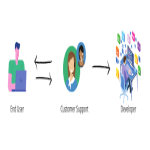Introduction
Blockchain technology is revolutionizing the financial sector by offering transparency, security, and efficiency in digital transactions. From cryptocurrencies like Bitcoin to decentralized finance (DeFi) platforms, blockchain is reshaping how people send, receive, and manage money.
In Africa, the adoption of blockchain is gaining momentum, especially in sectors like banking, remittances, and digital identity verification. This post explores how blockchain is transforming finance and what it means for businesses and individuals.
1. What is Blockchain Technology?
Blockchain is a decentralized digital ledger that records transactions across multiple computers in a secure, tamper-proof manner. Each transaction is verified by network nodes through cryptography and added to a "block," forming a chain of data blocks.
Key Features of Blockchain in Finance:
✅ Transparency: Every transaction is publicly recorded, ensuring accountability.
✅ Security: Data is encrypted, making it resistant to hacking and fraud.
✅ Immutability: Once a transaction is recorded, it cannot be altered.
✅ Decentralization: No single authority controls the network, reducing risks of manipulation.
2. Blockchain’s Impact on Finance and Digital Transactions
🔹 Faster Cross-Border Payments
Traditional money transfers often take days and incur high fees. Blockchain enables instant cross-border transactions with minimal costs. Startups like Flutterwave, Chipper Cash, and BitPesa are leveraging blockchain to simplify global payments.
🔹 Enhanced Security in Transactions
Blockchain’s encryption and decentralized structure reduce risks of fraud, identity theft, and payment tampering. Banks and fintech companies are adopting blockchain to secure customer data and transactions.
🔹 Decentralized Finance (DeFi)
DeFi platforms use blockchain to provide peer-to-peer financial services without intermediaries. Users can access loans, savings, and investments directly through smart contracts. Popular DeFi platforms like Aave, Uniswap, and PancakeSwap are gaining traction in Africa.
🔹 Digital Identity Verification
Blockchain allows for secure digital identities, reducing identity theft risks. Countries like Kenya, Nigeria, and Ghana are exploring blockchain for national ID systems and voter registration.
🔹 Tokenization of Assets
Blockchain enables the digitization of real-world assets like property, art, and stocks into digital tokens. This makes asset ownership and transfer more efficient.
3. Blockchain Adoption in Africa
African countries are rapidly embracing blockchain for financial inclusion and economic growth.
🇳🇬 Nigeria – The Central Bank of Nigeria launched the eNaira, Africa’s first central bank digital currency (CBDC).
🇰🇪 Kenya – Blockchain is used for land registration, reducing fraud in property ownership.
🇿🇦 South Africa – Financial institutions are using blockchain for secure payment processing.
4. Challenges Facing Blockchain in Finance
Despite its potential, blockchain adoption in finance faces obstacles:
❌ Regulatory Uncertainty – Some governments are still formulating blockchain policies.
❌ Scalability Issues – Blockchain networks can struggle with high transaction volumes.
❌ Energy Consumption – Certain blockchain systems require significant energy resources.
❌ Lack of Awareness – Many businesses are yet to understand blockchain’s benefits.
5. The Future of Blockchain in Finance
The future of blockchain in finance looks promising with innovations such as:
🚀 Central Bank Digital Currencies (CBDCs) – Digital currencies backed by governments.
🚀 Smart Contracts – Self-executing contracts that automate business agreements.
🚀 Blockchain-Powered Banking – Enhanced financial services using decentralized systems.
🚀 AI-Blockchain Integration – AI-driven insights to improve transaction security.
Conclusion
Blockchain is driving a digital finance revolution, offering speed, security, and transparency in financial transactions. As African businesses and governments embrace blockchain, the continent is set to become a global leader in digital finance innovation.
Is your business ready for the blockchain revolution?






